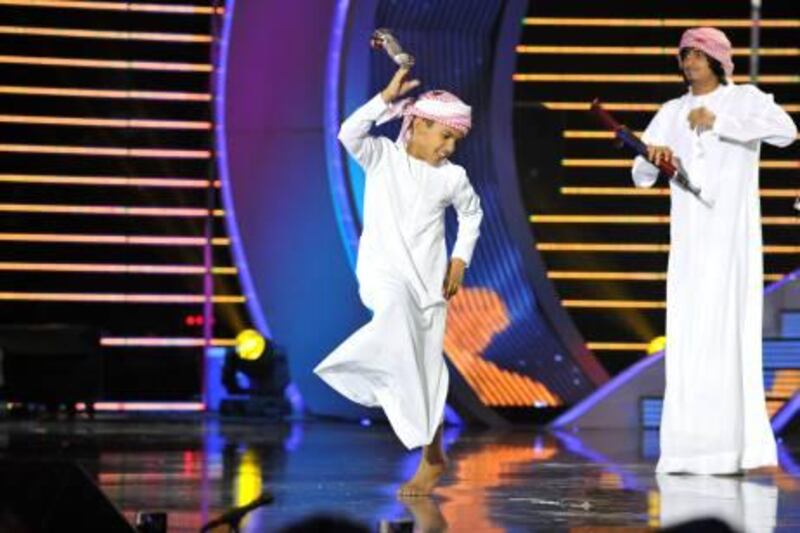DUBAI // Whenever the judges tried to single out the youngest of the five-member Emirati team on Arabs Got Talent, nine-year-old Saeed al Ameri would not have it.
"I am not the only star," he said. "Each and every one of us is a star."
That sense of brotherhood helped alleviate the disappointment that followed when the votes came in. The only Emirati team to make it to the popular contest's semi-finals, with their version of the traditional Yolla dance, was eliminated during the first live show on February 25. The show wraps up on April 8.
"It is OK," said Saeed. "We didn't win, but we didn't really lose either. We represented one of the UAE's traditional dances and we had fun doing it."
Their team, Eyal Zayed, or Sons of Zayed, performed the traditional dance which involves throwing wooden rifles into the air. In that episode, the Lebanese singer Joseph Dahdah won first place while second place went to a breakdancing duo from Morocco.
The reality TV show, marketed as the Middle East's version of other popular Got Talent shows that started in the UK, premiered in January on MBC4. About 100 acts tried out during auditions held at hotels in Abu Dhabi and Dubai last year.
The show's team travelled to 13 countries and auditioned more than 1,500 hopefuls - choosing just 300 for the first six shows, which were taped in Beirut.
The programme is broadcast at 10pm on Fridays with groups or individuals performing to win the top prize of 500,000 Saudi riyals (Dh489,000).
Saeed, who has been practising the Yolla dance since he was five, said he was not nervous performing on stage in front of the judges. And although the team is prevented by the show's rules from auditioning again, Saeed would be up for it. "I would go and do it all over again."
Up there with him was his 18-year-old brother, Hassan, and their cousins Saleh, 21, and Mohammed, 19, who are brothers. The fifth member is the family's 22-year-old neighbour, Salem, who is an al Ameri just like the rest of the crew.
"People joked and asked us why didn't we just call ourselves Eyal (Sons of) al Ameri," said Saleh. "We wanted to represent our country by naming ourselves after the father of the country, the late Sheikh Zayed."
The group has been performing together for five years during local festive occasions. But the team's opportunity to appear on Arabs Got Talent was "pure coincidence", said Saleh, the leader of team.
"An MBC producer saw our performance on local TV and suggested we apply online," he said.
Saleh said he had expected to see more performances native to this region, such as al Dabka dance, which involves stomping on the floor and kicking, and is performed in the Levant Arab countries. When Saleh told his friends the team would be performing the Yolla, they were not very encouraging.
"Everyone here told us no one would understand it and how it wasn't creative enough," he said. "But we stuck to it. I was actually disappointed not to see other contestants on the show performing any traditional talents, like al Dabka, but instead copying western talents."
Saleh thought perhaps not enough Emiratis knew about the show.
"I hope for the second season they do more local advertising so more Emiratis know where to go and how to apply," he said.
The MBC marketing team said there were plans for a second season of the show with expanded operations and advertising to reach more would-be hopefuls and encourage them to audition.
The Emirati team, flown into Lebanon four days before the live show, spent most of their time before the broadcast rehearsing.
The show's celebrity judges - the Lebanese singer Najwa Karam, the Egyptian talk show host Amr Adeeb, and the Lebanese journalist and academic Ali Jaber - called their performance "unco-ordinated" and "confusing".
"I disagreed with them," Saleh said. "I don't think they understood the dance and so to them it looked confusing. My brother and I were throwing two rifles at the same time, and each of the members had a solo moment in the centre of the stage."
The best thing about being on the show, he said, were the friendships formed and e-mail addresses exchanged. The contestants became unofficial ambassadors of their home countries.
"I learnt a lot about other Arab countries, like Libya and Egypt, and what is happening there, and they found out more about our country," he said. "We kept showing each other photos we had from our home countries and discussed them."
In the end, the team took their loss in stride.
"We just wanted to represent the UAE on the world stage and honour Sheikh Zayed by performing in his name," Saleh said.






